If you are reading this article, you might encounter a common dilemma: the Drupal vs Wix debate. If Drupal is the flexible open-source giant, then Wix is famous for its user-friendly website builder system.
Keep reading because in this article LitExtension – #1 eCommerce Migration Service will help you to find the answer to: Which platform is suitable for your business? Here are the key aspects we will compare between Drupal vs Wix:
- Pricing;
- Website builder tools;
- Themes & design;
- eCommerce features;
- Apps & integration;
- Hosting & performance;
- SEO & marketing;
- Mobile optimization;
- Security & compliance;
- Customer support.
Without further ado, let’s get started!
A Quick Introduction to Drupal vs Wix
Both Drupal vs Wix are popular platforms, each with its unique approach to building websites. Before diving into the specifics, I find it useful to first highlight what makes each one stand out. This quick overview will give us a better sense of their strengths and differences, helping to set the stage for a more in-depth comparison.
Drupal overview
Drupal is a highly flexible and powerful open-source content management system (CMS) known for its ability to build complex websites and applications. Originally designed as a platform for community-driven websites, Drupal has evolved into one of the most versatile and customizable CMS platforms available today, powering over 1.6 million websites (Source: BuiltWith).
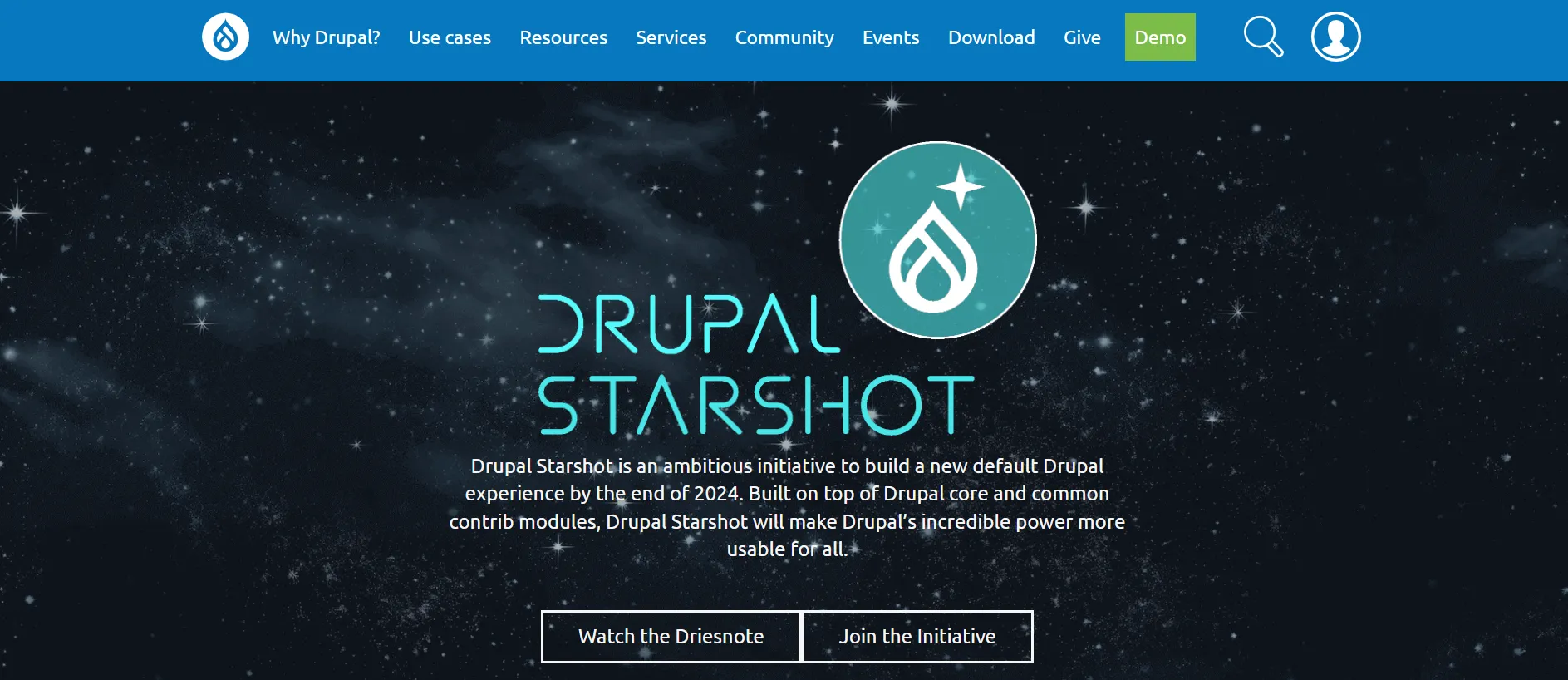
With its robust framework, Drupal is capable of supporting a wide range of content types, user roles, and complex workflows, making it an ideal choice for enterprises, governments, and large-scale organizations. Developers can create unique websites tailored to specific business needs, leveraging an extensive library of modules and themes.
Drupal Pros | Drupal Cons |
|
|
Wix overview
Launched in 2006, Wix has grown into one of the leading website builders, enabling users to create professional-looking websites without the need for coding knowledge. It focuses on providing pre-built templates and an easy-to-use platform that users can customize visually. As of now, Wix hosts approximately 8.6 million websites (Source: BuiltWith).
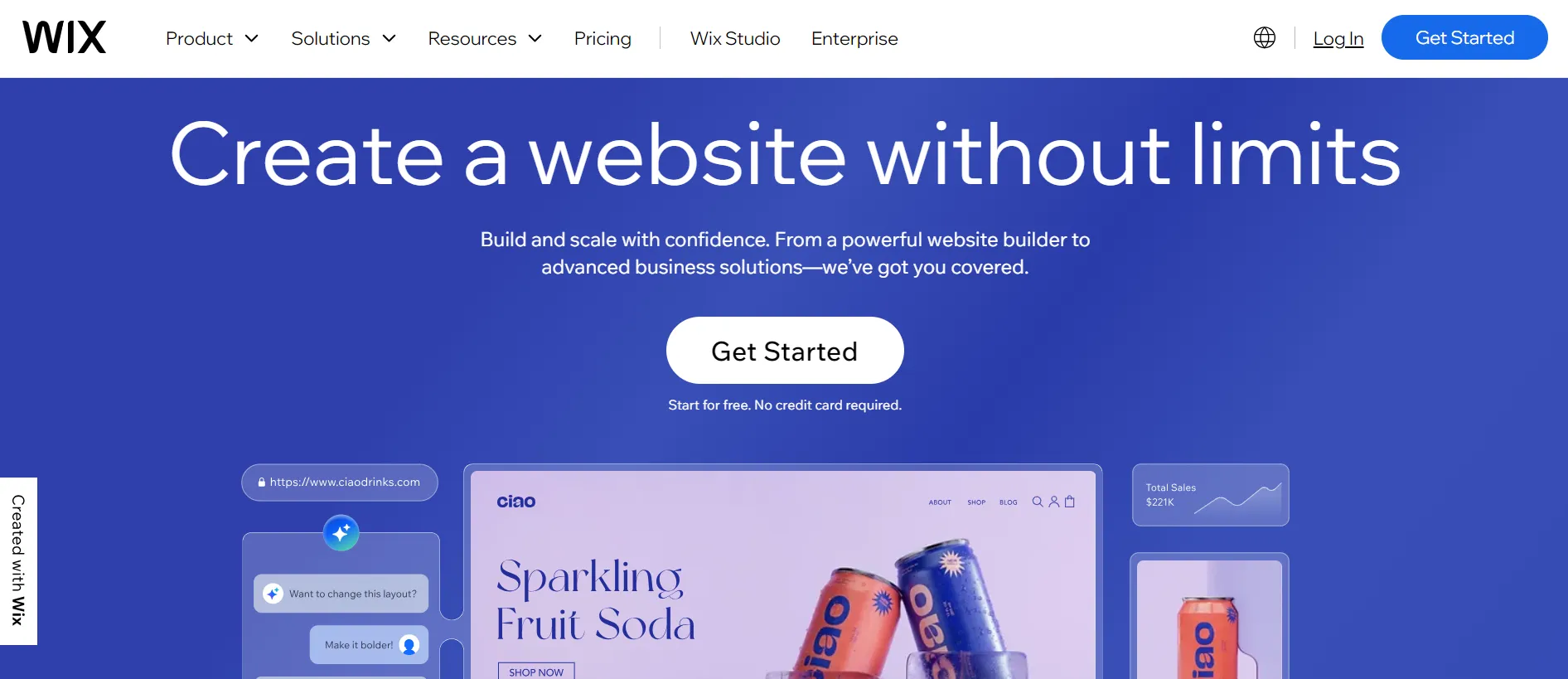
Beyond its simplicity, Wix also offers a range of built-in tools and features that cater to diverse business needs. From eCommerce capabilities to booking systems, Wix has a vast app marketplace that allows users to enhance their websites without needing external integrations. This makes it an ideal solution for individuals, small businesses, or anyone looking to set up a website with minimal effort.
Wix Pros | Wix Cons |
|
|
Wix vs Drupal: Which Platform Suits Your Business?
As you can see, both platforms have distinct strengths and weaknesses. But in the battle between Drupal vs Wix, Wix comes out on top for most users. Its intuitive drag-and-drop editor, vast template library, and all-in-one approach make it incredibly easy to build a professional website without any coding knowledge.
Despite that, Drupal still caters to a certain number of businesses. To help you visualize the strengths of each platform, here's a table illustrating the ideal website types for Wix and Drupal:
Website Type | Wix | Drupal |
Personal websites & portfolios | Ideal for freelancers and artists due to its ease of use and visual design options. | Need advanced coding skills to create. |
Small business websites | Perfect for local businesses like restaurants or salons, offering fast setup and basic tools. | Not as suitable as Wix. |
Portfolios | The go-to option for creatives to build visual portfolios. | Not as suitable as Wix. |
eCommerce stores | Suitable for small, simple online stores with limited product offerings. | Perfect for large-scale businesses needing custom features and integrations. |
Blogs and content sites | Great for personal or small blogs with simple content management. | Ideal for media-heavy sites or those requiring complex categorization. |
Membership sites | Simple membership sites. | Complex membership sites with custom roles. |
Corporate & enterprise sites | Not as suitable as Drupal. | Best suited for complex, large-scale corporate websites. |
Pricing (A Tie)
Drupal pricing
Drupal, being open-source, is technically free to download and use. However, “free” doesn't paint the whole picture. To get your Drupal site up and running, you'll need to factor in several costs:
- Domain name: Around $10/year;
- Drupal hosting fee: Starting from $4/month;
- Paid theme (optional): From $20/month for premium themes;
- Plugins (optional): Prices vary wildly, from free to $1000+ for premium plugins;
- Developer fees (potentially ongoing): Expect to pay around $40/hour for Drupal development work.
As you can see, Drupal's pricing is modular. You have the flexibility to choose exactly what you need, but that often means piecing together different services and potentially paying for development help.
Wix pricing
On the other hand, Wix pricing takes a more streamlined approach. They offer four premium tiers, ranging from $17 to $159 per month. Each plan comes with a specific set of features catering to different needs, from basic websites to full-blown eCommerce stores:
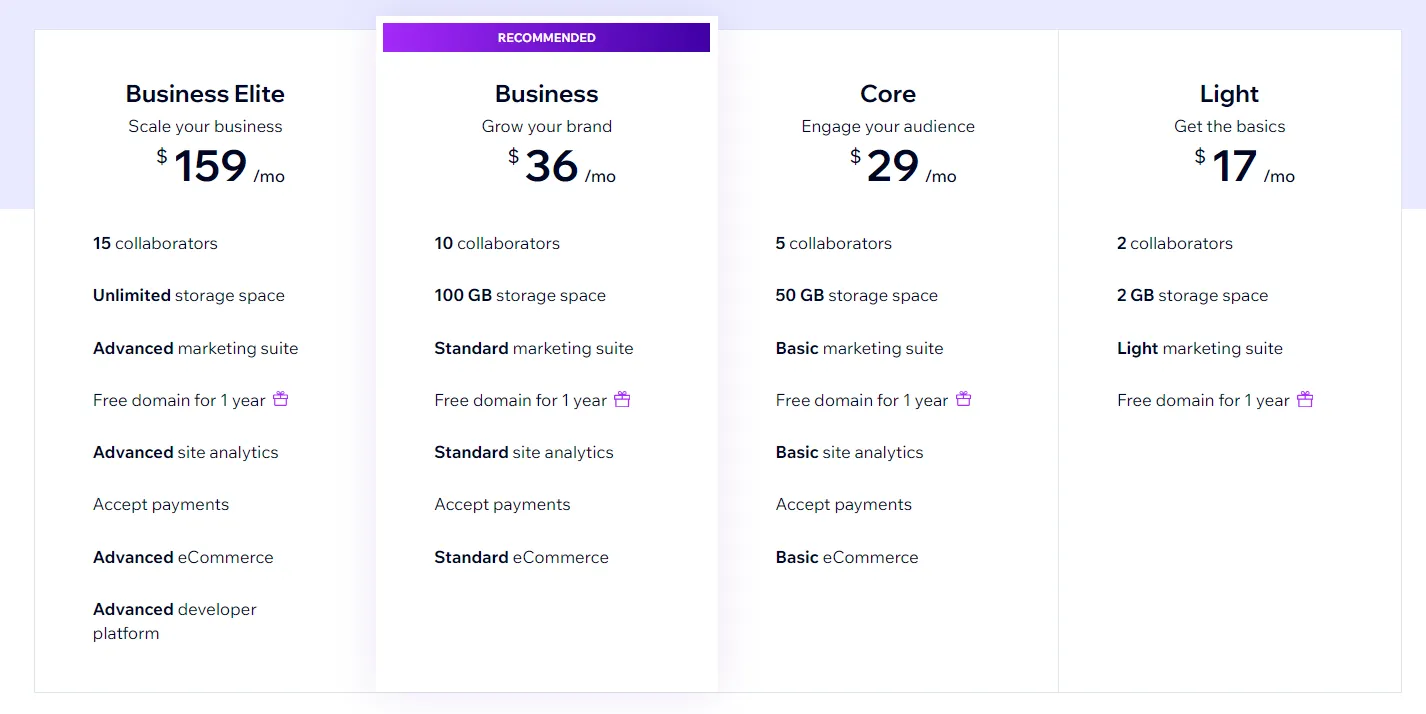
Wix also understands the value of trying before you buy. They offer a forever-free plan, letting you test the waters before committing to a paid plan. However, keep in mind that the free plan comes with limitations such as Wix-branded domain names, limited storage, and restricted eCommerce features.
The Verdict
In the Drupal vs Wix pricing battle, there's no clear winner. It's more about finding the pricing model that aligns with your needs and budget. Drupal offers flexibility and control, with potential cost savings for tech-savvy users, while Wix offers predictable pricing and simplicity, ideal for beginners.
Website Builder/Editor (Wix Wins)
Drupal website builder
Drupal's website-building approach centers around coding, offering high flexibility and customization for those fluent in website development languages. However, this does mean users will face a steeper learning curve if they lack coding experience.
Fortunately, Drupal allows for integrations with third-party applications like DPRX and Drupal Layout Builder. These integrations introduce user-friendly features such as drag-and-drop functionality and visual editing tools, streamlining the website-building process.
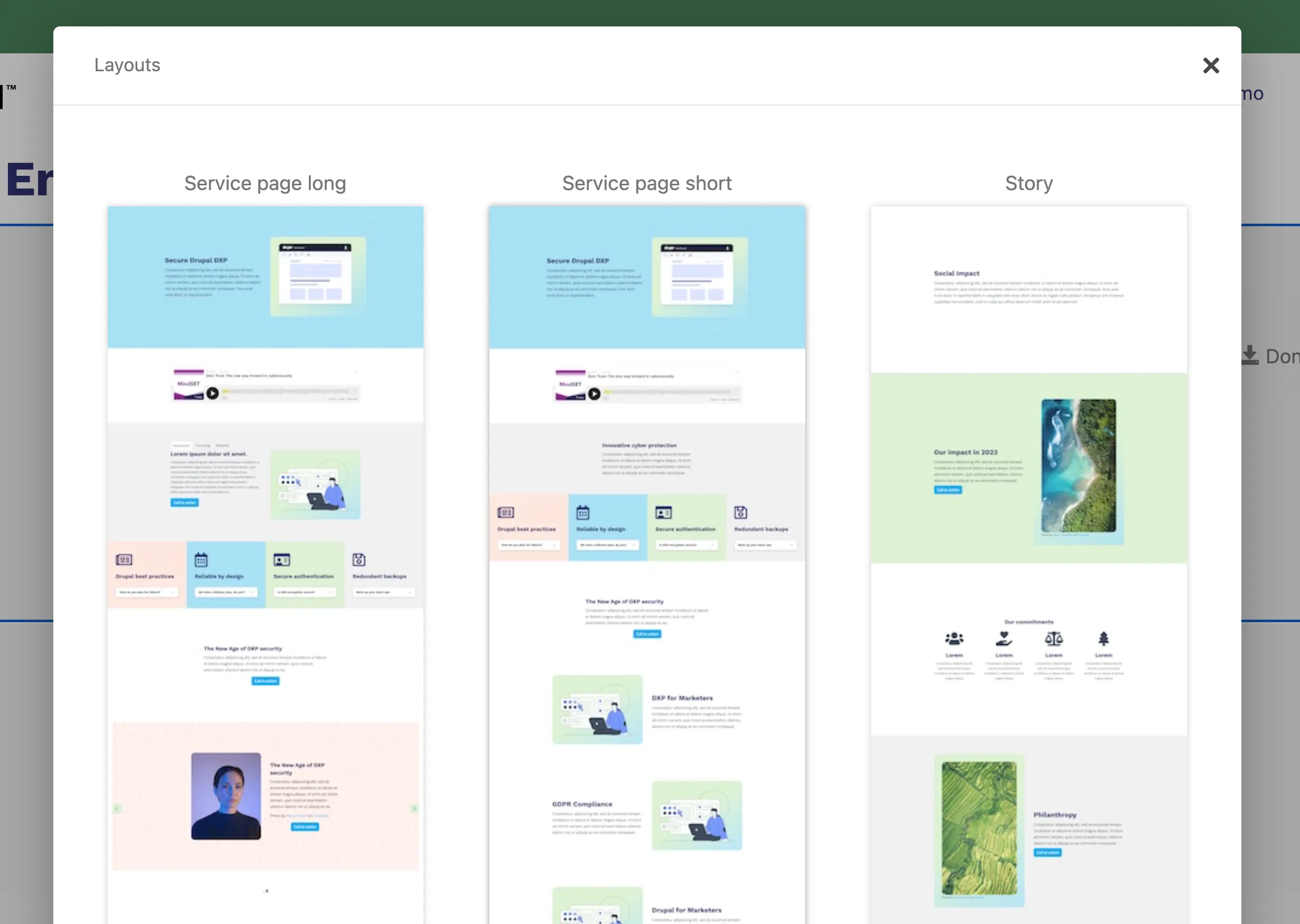
Wix website builder
Wix, on the other hand, champions user-friendliness with its intuitive drag-and-drop website builder. It provides an array of tools designed for ease of use:
- Wix Editor: The classic drag-and-drop editor offers design freedom and a vast library of templates.
- Wix Editor X: Geared toward designers and agencies, Editor X offers advanced design features and responsive control.
- Wix ADI (Artificial Design Intelligence): Answer a few questions, and Wix ADI will generate a personalized website design for you.
- Wix Velo: For developers who want more control, Velo allows for custom code integration within the Wix platform.
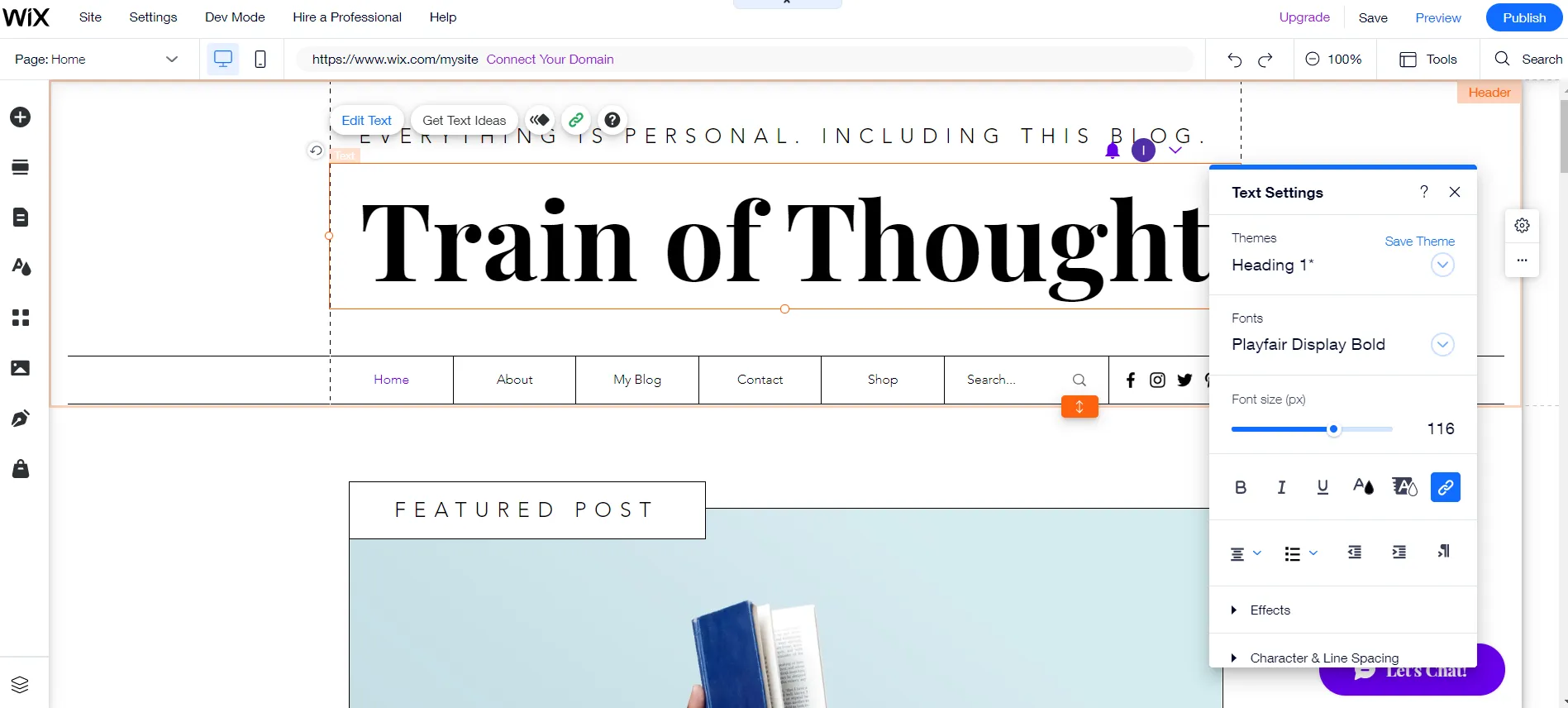
This diverse suite of website builders ensures that Wix caters to a wide range of users. Whether you're a complete beginner seeking simplicity or an experienced designer looking for advanced functionality, Wix provides a user-friendly environment to bring your vision to life. For more details, you can always refer to our Wix website builder review.
The Verdict
In this Drupal vs Wix competition, Wix stands out as the clear choice. Its intuitive drag-and-drop interface, variety of design tools, and focus on accessibility make it much easier to use than Drupal’s more technical, code-heavy approach.
Themes & Design Functionality (Drupal Wins)
Drupal themes
Drupal offers access to a robust library of over 3,000 eye-catching themes, providing a solid starting point for users. Beyond these pre-designed options, users have the flexibility to craft their own custom themes or seamlessly upload existing ones. This allows for maximum control over every design element, ensuring a website that perfectly aligns with their brand identity and creative vision.
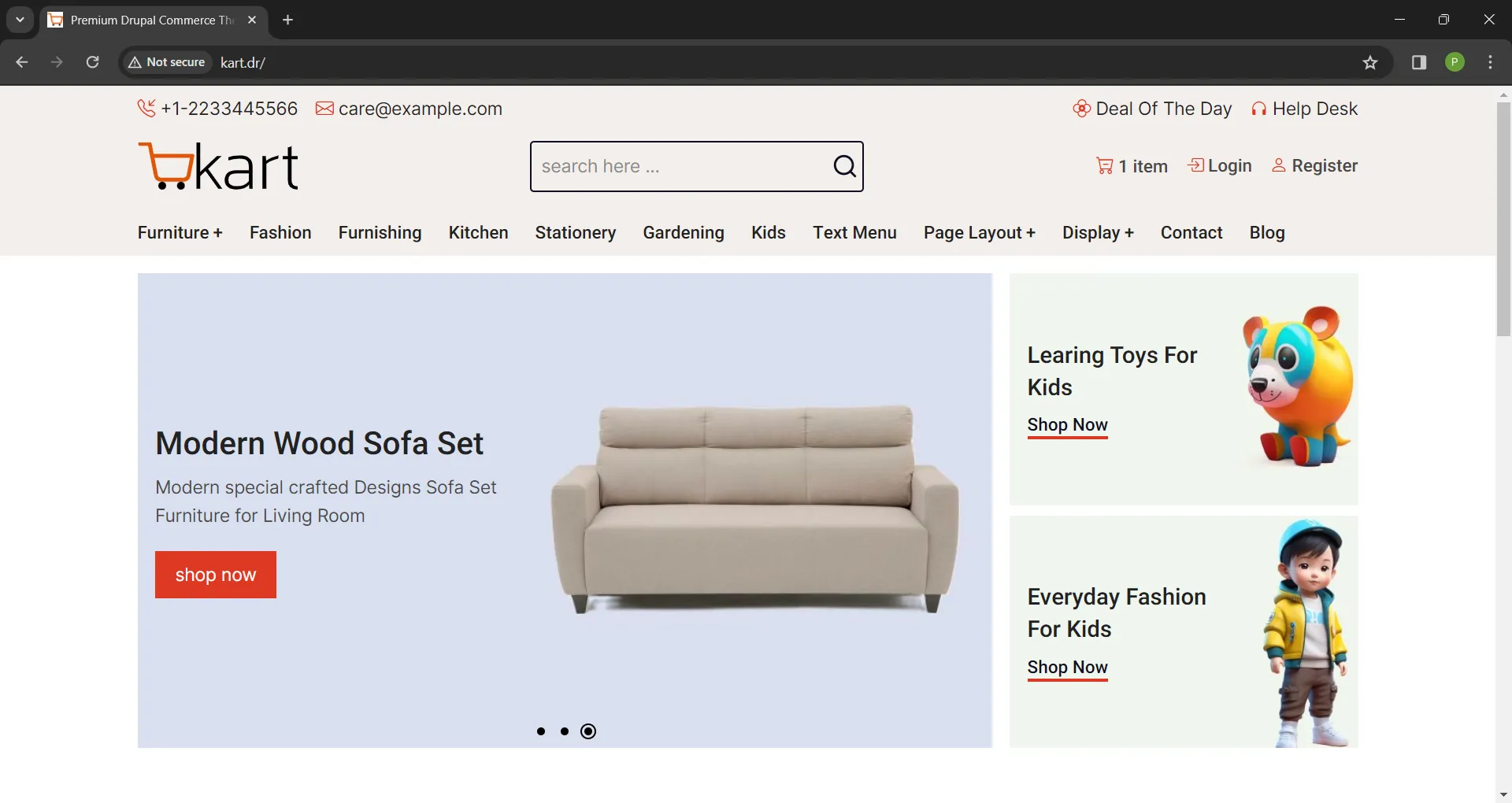
Wix themes
Even though Wix may offer a smaller selection of themes compared to Drupal (900 templates), it prioritizes quality and design excellence. These templates, neatly categorized for various purposes, are crafted to be visually appealing, user-friendly, and responsive across different devices.
Whether you're building a blog, an online portfolio, or an eCommerce store, Wix has a template to suit your needs. However, its code customization capabilities are limited compared to Drupal, offering less flexibility for users who require advanced design control.
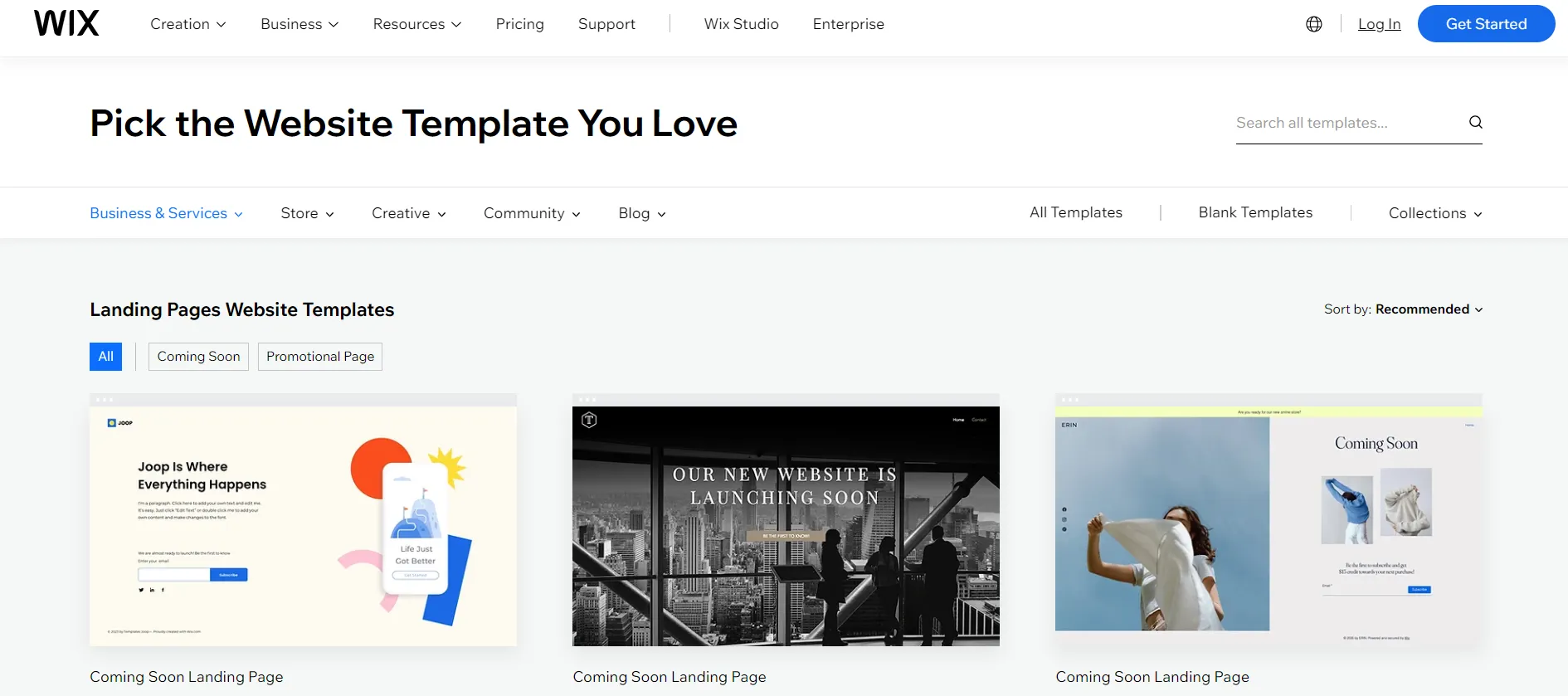
The Verdict
In terms of design flexibility between Drupal vs Wix, Drupal takes the lead. However, for individuals with limited coding skills or those who prefer pre-designed aesthetics, Wix is an attractive option.
eCommerce Features (Wix Wins)
When it comes to eCommerce, both Drupal and Wix bring unique features to the table. In this comparison, I'll walk you through some key aspects that matter most for running a successful online store:
- Inventory management
- User roles
- Payment
- Shipping
By the end, you will have a clearer idea of how each platform handles these important areas and which might suit your needs best.
Inventory management
Drupal Commerce provides comprehensive tools to handle even the most complex inventory needs. Create and categorize products, set up variations like sizes and colors, track stock levels meticulously, and even manage batch inventory updates. This makes the platform a perfect option for businesses with diverse product catalogs and intricate stock management needs.
Meanwhile, Wix offers a more streamlined inventory management system, perfect for smaller businesses or those just starting out. It covers the essentials: effortlessly adding products, creating variations, managing stock, and receiving low-stock notifications. While lacking the depth of Drupal Commerce, Wix's simplicity makes it ideal for users who prioritize ease of use and a clutter-free experience.
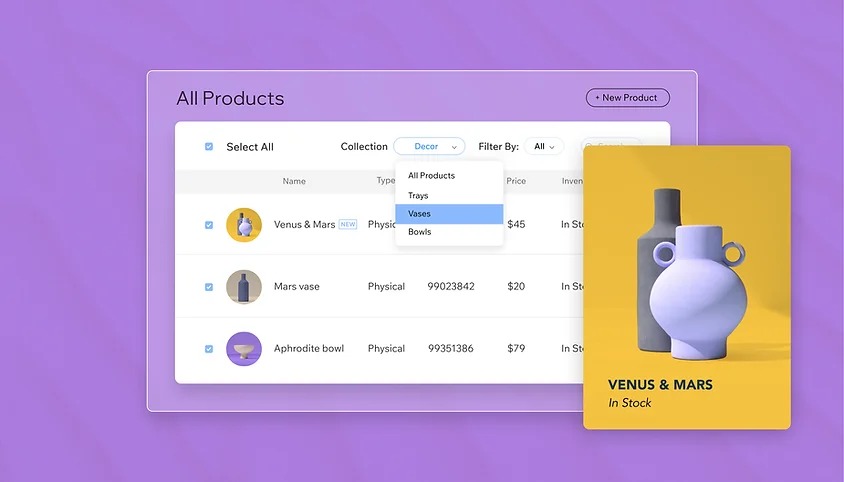
User roles
Both Drupal vs Wix offer the ability to create an unlimited number of user accounts, but they differ in how user management is handled. Drupal allows administrators to create multiple roles with tailored permissions, such as “Editor” or “Administrator.” This flexibility gives Drupal users more control over access and tasks within the site.
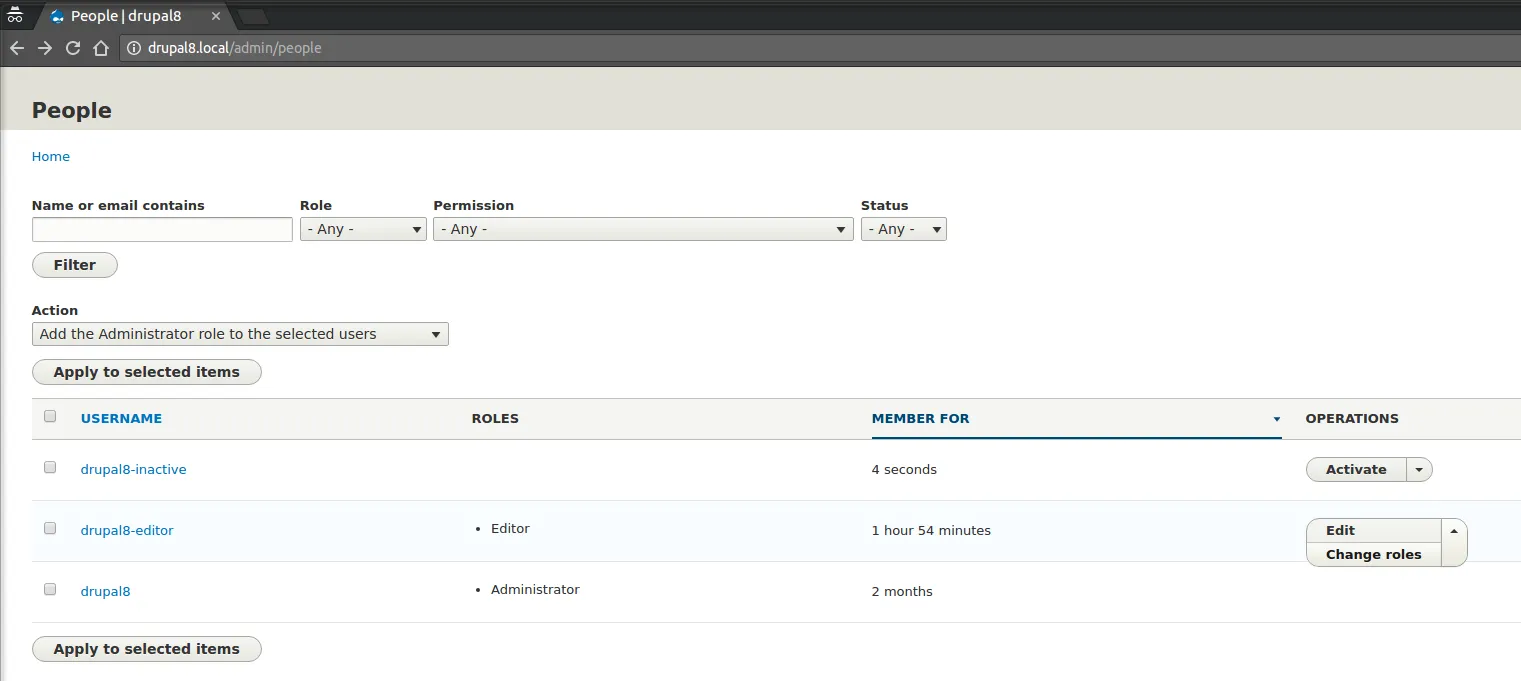
With Wix, adding unlimited editors is straightforward and available across all plans. However, once you exceed 50 editors, performance issues in the backend may occur, requiring caution when scaling up collaboration.
Payment
In terms of payment gateway integration, both Drupal vs Wix offer extensive options. When choosing Drupal, you can freely integrate with any payment gateway that you want, including custom solutions tailored to specific needs. But, to reach the full potential of payment integration, you will need a decent level of coding skills, which I think is not a fit for starters.
With Wix, the platform supports over 80 payment gateways, covering popular options like PayPal, Stripe, and Square. Setting up these integrations is generally straightforward, requiring minimal technical configuration. Nonetheless, it charges a transaction fee of around 2.9% + 30¢ per transaction on certain plans unless you are using Wix Payments.
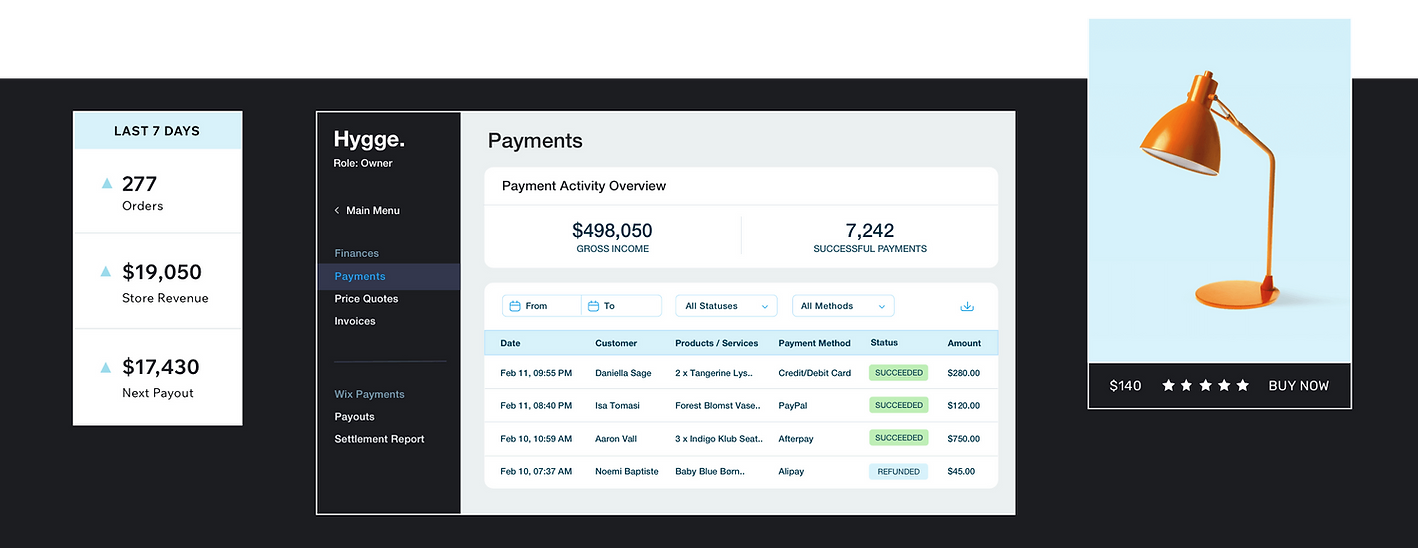
Shipping
When it comes to shipping and dropshipping, Drupal Commerce relies heavily on third-party solutions. For this reason, you will need to research, choose, and integrate suitable modules for everything from calculating shipping costs to managing order fulfillment with dropshipping suppliers.
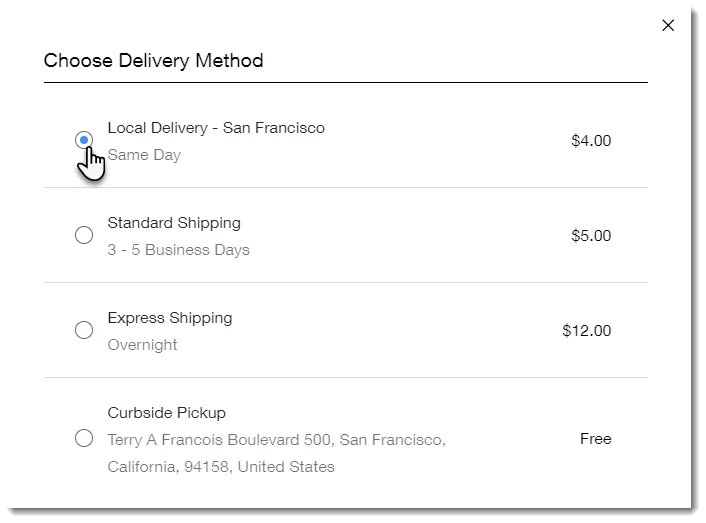
Wix, on the other hand, simplifies the process with built-in features that streamline setting up your online store and managing shipping. You can easily configure shipping rates, methods, and options directly within the Wix dashboard, making it beginner-friendly. For further enhancement of the dropshipping system, there is a vast collection of apps in the Wix store for you to integrate with, such as Printful.
The Verdict
In this round, Wix stands out by offering built-in features, while Drupal relies on third-party modules for key functionalities. This makes Wix a more convenient and accessible choice for a complete eCommerce solution.
Apps & Integration (Drupal Wins)
Drupal modules
Drupal's vibrant and active community is a driving force behind its expansive plugin ecosystem. With a staggering collection of over 52,000 modules (Drupal's term for plugins), the possibilities for extending your website's functionality are virtually limitless. Many of these modules are freely available, providing businesses with cost-effective ways to enhance their websites with features ranging from SEO optimization to eCommerce integrations.
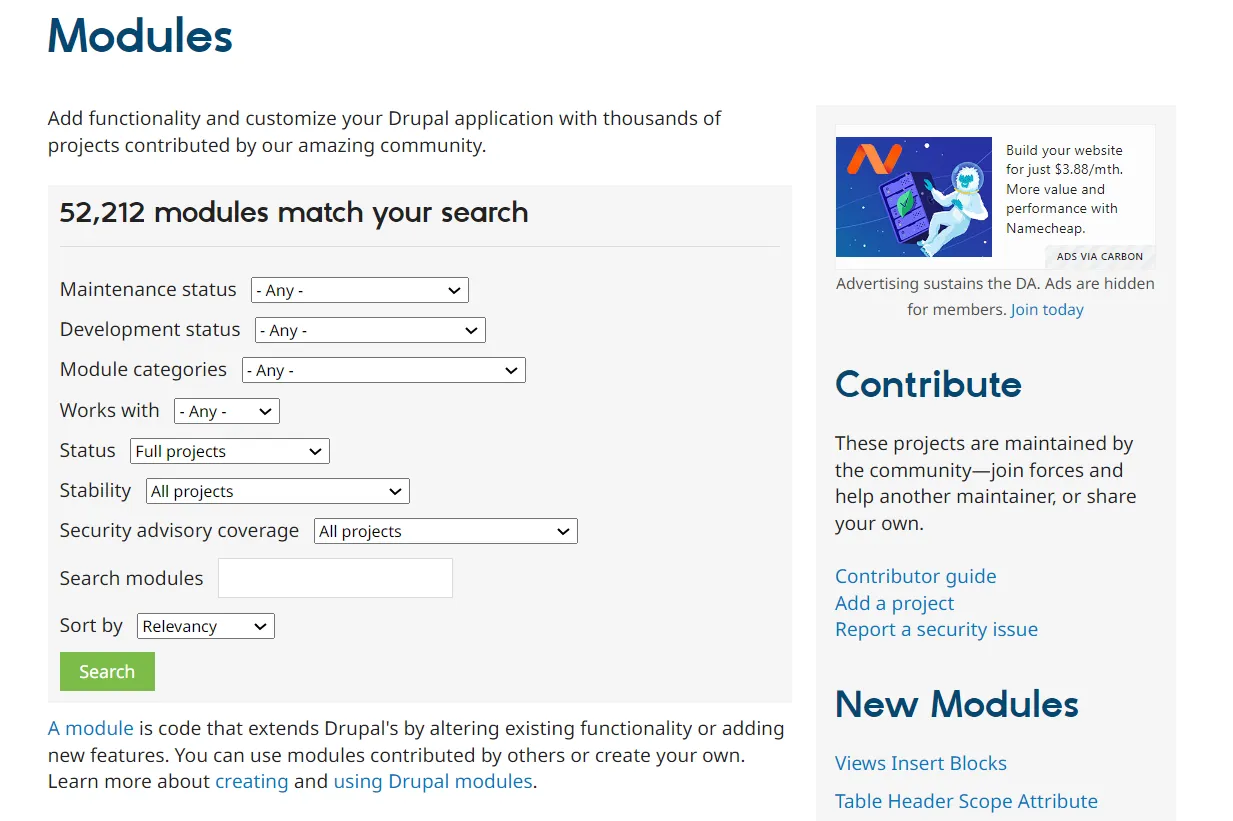
Wix apps
Similar to themes, the number of Wix apps can not beat Drupal. Nevertheless, I still love how all of these 800 add-ons are carefully chosen by the Wix team to address the common needs of online businesses. These apps span a wide range of categories, including marketing, analytics, customer engagement, and eCommerce.
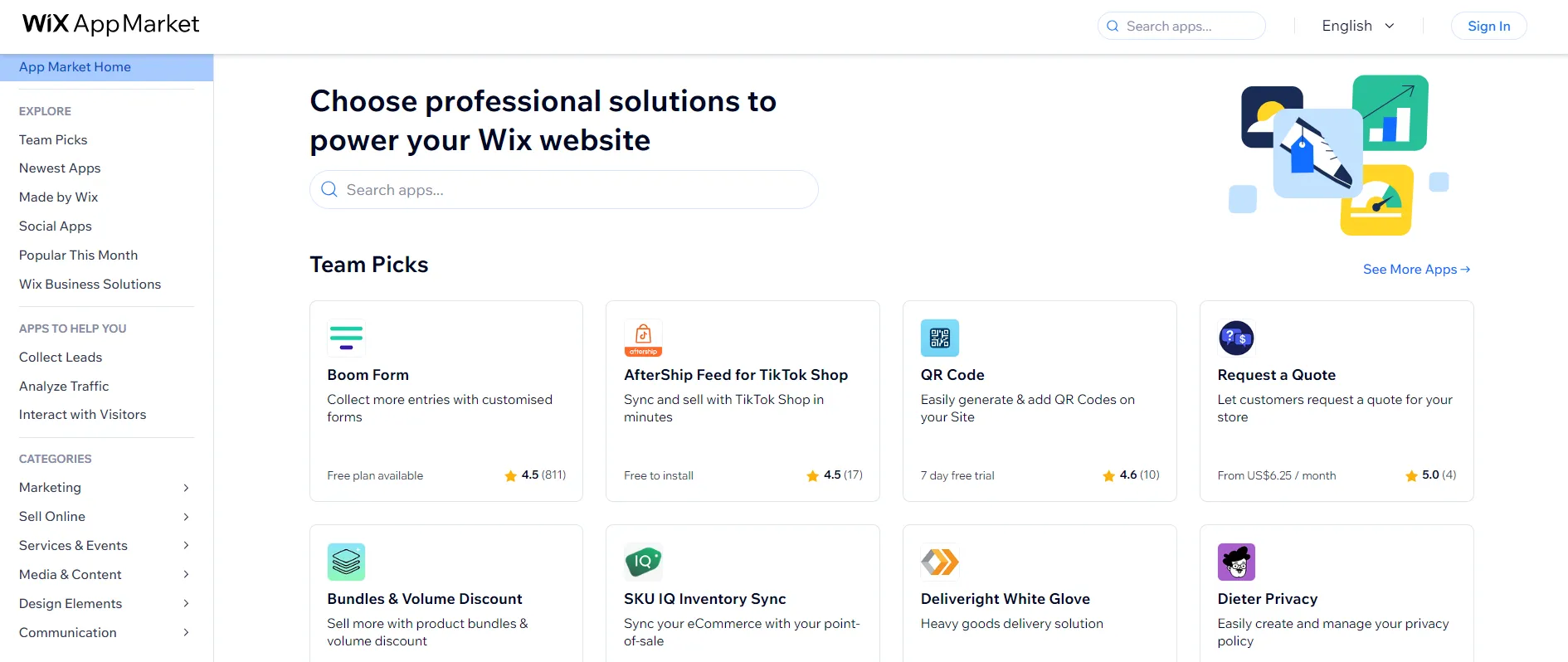
While Wix's app selection may not be as expansive as Drupal's, it focuses on providing high-quality integrations with popular services like QuickBooks, Mailchimp, and Google AdSense. Wix apps offer a mix of free, freemium, and paid options, giving users flexibility in choosing the tools that align with their budget and requirements.
The Verdict
With its dominant number of modules, Drupal easily surpasses Wix in this round. Whether you're looking for a free module to enhance your SEO or a premium solution for advanced eCommerce functionality, Drupal's vast plugin ecosystem likely has you covered.
Hosting & Performance (Wix Wins)
Drupal performance
Drupal, true to its open-source nature, doesn't directly provide hosting services. This means you have the flexibility to choose a hosting provider that aligns with your specific needs and budget. However, this flexibility also comes with the responsibility of researching, selecting, and managing your hosting environment.
For this reason, factors like uptime, server resources, and security measures will vary depending on your chosen provider. While Drupal, when optimized correctly, can achieve excellent performance, it requires more technical know-how compared to Wix's streamlined approach.
Wix performance
With Wix, hosting is a breeze – it's seamlessly integrated into their platform. They offer a range of plans, from a free option with limited resources to premium plans boasting up to 50GB of storage and unlimited bandwidth.
Moreover, Wix takes performance seriously, utilizing 10 global data centers and boasting a 99.95% uptime, ensuring your website stays up and running smoothly. This all-in-one approach simplifies website management for users, freeing them from the complexities of choosing and managing a separate hosting provider.
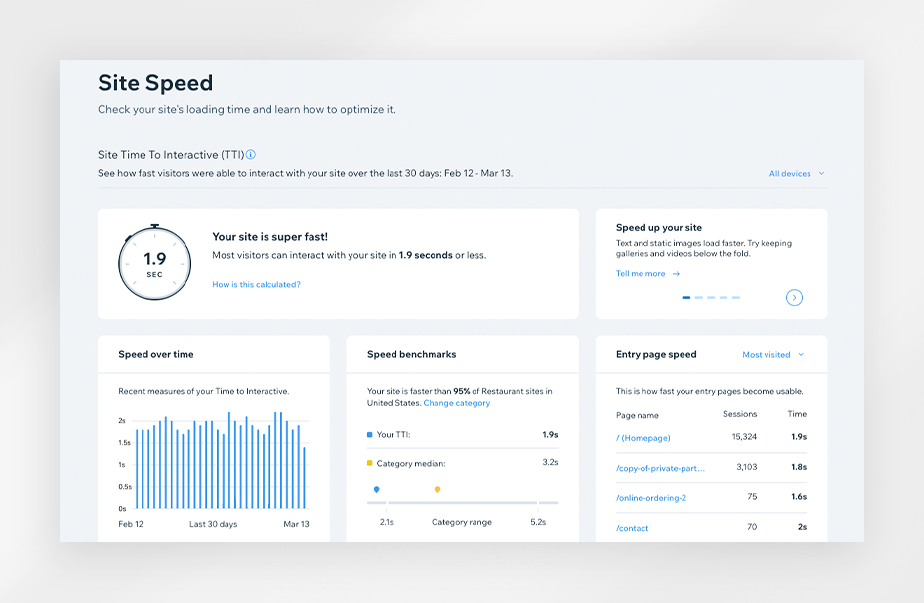
The Verdict
While both platforms can deliver fast-loading websites, Wix secures the win in this round of the Drupal vs Wix showdown. With its integrated hosting, global infrastructure, and impressive performance track record, Wix makes it easier for users to achieve optimal website performance without technical difficulties.
SEO & Marketing Features (Wix Wins)
Drupal SEO and marketing features
Drupal provides a powerful foundation for SEO and marketing, but most of these capabilities are accessed and enhanced through modules. My advice is to carefully research and select modules that align with your specific SEO and marketing needs, ensuring you leverage the platform's full potential for online success.
- SEO: Drupal excels in technical SEO, allowing for customization of meta tags, XML sitemaps, URL structures, and more. However, these features often require coding knowledge or the use of modules.
- Blogging: Drupal has robust blogging capabilities, with features for content creation, categorization, commenting, and SEO optimization, often requiring module configurations.
- Social media: Social media integration is primarily achieved through modules, providing flexibility in choosing the platforms and features you want to incorporate.
- Analytics: Drupal integrates with analytics platforms like Google Analytics through modules, enabling in-depth tracking and analysis of website traffic.
Wix SEO and marketing features
Wix shines in its user-friendliness, offering an intuitive suite of built-in SEO and marketing tools designed to empower users of all skill levels.
- SEO toolset: Wix handles many technical SEO aspects seamlessly, including mobile responsiveness, XML sitemaps, customizable meta tags, and 301 redirects, ensuring a solid SEO foundation. There is also an SEO setup checklist available to help beginner optimize their websites effectively.
- Blogging: Wix offers a user-friendly blogging platform with customizable designs, built-in SEO features, and social media sharing options to amplify your content's reach.
- Google integrations: Connect your website effortlessly with Google Search Console and Google Analytics to gain valuable insights into your website's performance and search visibility.
- Social media ads: Create and manage engaging Facebook and Instagram ad campaigns directly from your Wix dashboard, with the help of Wix's AI-powered tools.
The Verdict
In the Drupal vs Wix debate, while Drupal provides extensive flexibility and control for advanced users, Wix takes the lead in this round with its ease of use and robust built-in SEO and marketing tools. Users can easily optimize their sites, manage social media, and track performance without dealing with complex coding or modules.
Mobile Optimization (Wix Wins)
Drupal mobile optimization
With Drupal, you can achieve a responsive design, adapting seamlessly to different screen sizes, by using custom themes or leveraging mobile-specific modules. This level of customization offers higher control over your website's mobile experience, but it also requires a deeper understanding of responsive design principles or the assistance of a developer.
Wix mobile optimization
All Wix websites are automatically optimized for mobile devices, ensuring that your content looks great and functions smoothly on any screen size. Wix goes a step further by offering a separate mobile editor, allowing you to fine-tune the mobile version of your website for an optimal user experience.
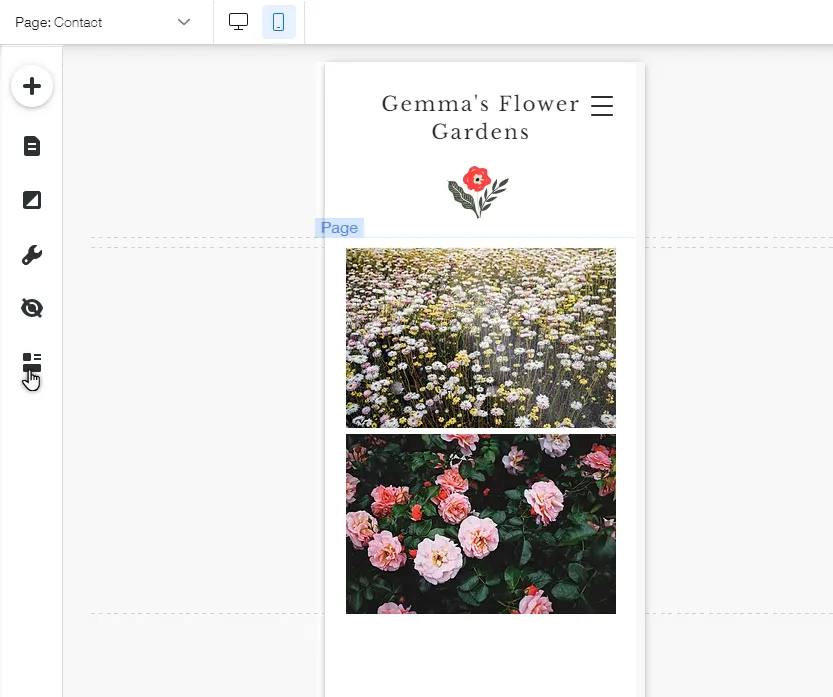
The Verdict
Wix's built-in mobile optimization and user-friendly mobile editor make it the clear winner in this round of the Drupal vs Wix competition. Users can rest assured that their websites will look and perform seamlessly on mobile devices without needing to delve into complex coding or responsive design techniques.
Security & Compliance (Wix Wins)
Drupal security
Since Drupal is an open-source platform, it offers powerful security tools but relies heavily on user configuration and maintenance. Features like role-based access control and data encryption are available, but users need technical knowledge to implement them effectively. While Drupal benefits from a proactive community that quickly addresses vulnerabilities, users are responsible for promptly applying updates.
Wix security
In the meantime, Wix takes the worry out of website security, providing a safe and secure environment from day one. Every Wix site comes with built-in features like HTTPS/TLS encryption for online transactions, Level 1 PCI Compliance, and TLS 1.2 standards for secure data handling. Not to mention, Wix rigorously tests its platform against vulnerabilities and uses robust DDoS protection to ensure constant uptime.

The Verdict
Between Drupal vs Wix, Wix wins this round by providing a secure foundation from the start. Its built-in security, automatic updates, and proactive measures offer peace of mind, especially for users without deep technical expertise.
Customer Support (Wix Wins)
Drupal customer support
While Drupal does offer some official documentation and resources, users primarily find solutions through forums, online communities, and Q&A sites dedicated to Drupal. For help, you can also seek the answers from their vibrant community of users and developers.

For those seeking more direct and professional support, you can refer to 24/7 customer service from Drupal Connect through flexible plans. However, it's important to note that Drupal itself lacks dedicated enterprise-level support, which could pose a challenge for larger organizations requiring more tailored assistance.
Wix customer support
On the contrary, Wix understands the importance of reliable support and provides users with a variety of convenient channels to get help whenever they need it. Their 24/7 live chat, available in multiple languages, ensures that assistance is always just a message away.
For more in-depth guidance, users can access phone support during business hours or tap into Wix's large and active community forum for peer-to-peer assistance and insights. This multi-faceted approach to customer support ensures that Wix users have a lifeline no matter their preferred communication style or the time of day.

The Verdict
In my experience, when it comes to customer support between Drupal vs Wix, the latter really stands out. With 24/7 live chat, phone support, and a great community forum, it’s just more accessible and convenient. Even though Drupal has third-party options, it doesn’t quite offer the same level of support that Wix does.
Drupal vs Wix: FAQs
Is Drupal similar to Wix?
Drupal and Wix are quite different in terms of how they work. Drupal is an advanced open-source CMS designed for developers who need flexibility and control over their website's structure and content. Meanwhile, Wix is a drag-and-drop website builder aimed at beginners, providing ease of use without requiring coding skills.
What is better than Drupal?
WordPress is often considered a more user-friendly alternative with many customization options, while Shopify is better for eCommerce sites. Drupal, however, remains the best choice for complex, scalable, and secure websites requiring high customization. Nevertheless, the final answer should be depending on your unique needs.
Is Drupal a good website builder?
Yes, Drupal is a great website builder, particularly for developers or businesses needing a robust, flexible, and secure platform. It offers powerful content management features and the ability to build highly customized websites. However, it has a steeper learning curve compared to simpler builders like Wix or Squarespace, so it may not be the best option for beginners or those without development skills.
Which website is better than Wix?
If you need more flexibility and customization options, platforms like WordPress may be better than Wix. If you're focusing on eCommerce, Shopify might be a better choice due to its specialized features for online stores.
Final Thoughts
We've explored the battlegrounds of website building, from pricing and design to security and SEO, dissecting the strengths and weaknesses of both Drupal vs Wix. As we lower the curtain on this epic showdown, one thing remains clear: Wix would be the suitable solution for a wider number of businesses.
While Drupal is super flexible and great for tech-savvy people who want a unique website, Wix is easier to use for most people. Anyone can create a nice-looking website that works well, without having to worry about the technical stuff. Wix takes care of all of that behind the scenes.
Whether you are migrating your website to Wix or Drupal, LitExtension provides a reliable and comprehensive migration solution. With LitExtension, you can seamlessly transfer your website data without any technical expertise required.
Hungry for more eCommerce insights? Explore our in-depth comparisons of other leading eCommerce platforms or join the community group to discover the perfect fit for your online business!

